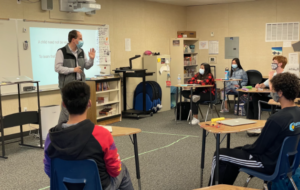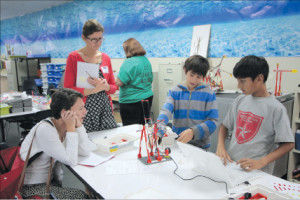Published: 24 March 2021 Written by Kaitlyn Huang – Town Crier Editorial Intern
Bullis Charter School student Nyla Hayhoe of Los Altos hopes to educate the community on the climate crisis through a webinar series she launched in January that features expert panelists.
The eighth-grader calls it “Dolphins (Always) Know Best,” a nod to the sci-fi series “The Hitchhiker’s Guide to the Galaxy.” Not only was she intrigued by the “Hitchhiker’s” series’ theories on how dolphins are the second most intelligent species, she was inspired by a song in it, “So Long, and Thanks for All the Fish,” about dolphins and a human’s obliviousness to the deterioration of the Earth.
“The similarities between the fictional plot and now is uncanny,” Nyla said.
Every month, she converses with experts on climate change. Each webinar runs an average of 45 minutes.
The next one, set for noon March 27, will feature entomologist, climate activist and equality advocate Esther Ngumbi as well as Christine Evans, author of “Evelyn the Adventurous Entomologist: The True Story of a World-Traveling Bug Hunter.”
Nyla said working with marine biologists during a field trip to Costa Rica in sixth grade inspired her to create the series. Additionally, learning to set passion-driven goals at school and writing a white paper as a national representative in the global youth-led movement Decarbonize Decolonize drove her to begin her own initiative. She said she realized that “not only people globally are doing it, but that we have the ability to instigate change.”
Change that will help more than humans.
“The whole kind of idea was talking about how animals are the ones who are experiencing this right now,” Nyla said of “Dolphins (Always) Know Best.”
She added that dolphins and animals “always know” the environment the best.
“We must look to them to find our empathy and solutions,” Nyla said.
TARGET DEMOGRAPHIC
Through her webinars, Nyla said she hopes to “amplify voices and to educate and inspire change.”
“If people, especially youth, are given a space to be curious and ask questions and get knowledgeable answers in return, we’re able to cultivate a passion and knowledge towards sustainable and systemic change,” she said.
Los Altos resident Grace Lam, who has attended the webinars with her family, added that Nyla tailored them to accommodate a younger audience.
“I think this can be quite abstract for them,” Lam said. “So seeing someone that (my children) know who is passionate about it and has come to a place where she can bring together individuals who are experts in their field, and then share that with our school community and beyond has been really exciting.”
Sarah Flynn, program director for The Centre for Global Education, was also impressed with Nyla’s work.
“She’s very good at facilitating,” Flynn said. “They were lively events and interactive, and the speakers – you could tell they felt relaxed and that it was more of a conversation than it was a lecture.”
The Centre for Global Education runs the Decarbonize Decolonize project with TakingITGlobal, a nongovernmental organization that encourages youth involvement in global issues.
According to Nyla, inviting scientists and experts can help “pull that inspiration.”
“That’s something I’d like to capitalize on, because all of my panelists so far and going forward not only are knowledgeable, but they’re able to share an aspect that we don’t think about.”
Lam added, “I think that it has sort of percolated my son’s interest just because of what they shared.”
Marine biologist Nathan Robinson, who participated as an expert panelist in Nyla’s February webinar, said “it was an honor” to have been part of the panel.
“Nyla is an inspirational future leader, and it’s always fantastic to have the opportunity to talk (and) raise awareness about the ecological issues that our planet is facing,” he said.
TAKING ACTION
Once the pandemic is over, Nyla hopes her initiative can expand beyond webinars and include hands-on projects and fundraising events. However, she said the webinars will remain a fundamental part of “Dolphins (Always) Know Best” because they give experts “a platform to share their views,” which prompts viewer curiosity.
“When you are curious, you start thinking about it more often,” she said.
Growing up surrounded by nature instigated Nyla’s passion for the environment.
“The Jurassic Coast was my playground, and then going to India all the time you (would) see all of the animals,” she said. “I think it’s just growing up in the environment you grew up in, especially because my family’s really involved with the outdoors and nature.”
Nyla emphasized the need to “learn now” about the environment and take action promptly to preserve it because “we don’t have much time left.”
She added that young people have the largest potential to initiate sustainable change.
“Youth just have this really special way of connecting with something,” she said. “And when they connect with something, they’re able to bring that emotional connection towards a tangible solution.”
Read the article in the Los Altos Town Crier


 When Athletic Director Joseph Stark introduced his love of archery to students at Bullis Charter School this year, he hit the bull’s-eye.
When Athletic Director Joseph Stark introduced his love of archery to students at Bullis Charter School this year, he hit the bull’s-eye. Teachers Implement Digital Learning Plans Aligned with Best Practices
Teachers Implement Digital Learning Plans Aligned with Best Practices One of Only Three Schools in the State to Meet Criteria for Certification
One of Only Three Schools in the State to Meet Criteria for Certification Fourth- and fifth-graders at Bullis Charter School stepped into the role of teacher last week when they taught kindergarten and first-grade students how they can help save leatherback sea turtles.
Fourth- and fifth-graders at Bullis Charter School stepped into the role of teacher last week when they taught kindergarten and first-grade students how they can help save leatherback sea turtles. Bullis Charter School has a new tool in its arsenal this year as it tackles the implementation of Common Core curriculum standards.
Bullis Charter School has a new tool in its arsenal this year as it tackles the implementation of Common Core curriculum standards. A group of Bullis Charter School parents established the Bullis Boosters Summer Bridge Camp to provide a summer camp experience for underserved local students.
A group of Bullis Charter School parents established the Bullis Boosters Summer Bridge Camp to provide a summer camp experience for underserved local students.